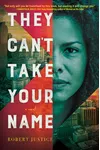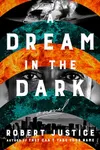Picture a Denver storyteller who’s turning the crime fiction world upside down with heart-pounding tales and a mission to fix a broken system—meet Robert Justice! A native of the Mile High City, Justice burst onto the scene with his debut novel, They Can’t Take Your Name, a gripping crime story that tackles the gut-wrenching issue of wrongful convictions. As a novelist and host of the Crime Writers of Color podcast, he’s not just spinning yarns; he’s amplifying underrepresented voices and advocating for justice reform with a passion that’s as infectious as his prose.
With a knack for blending atmospheric storytelling with social commentary, Justice has carved out a unique space in socially conscious crime fiction. His work doesn’t just entertain—it challenges readers to confront the flaws in the American justice system while rooting for characters who fight against all odds. Let’s dive into the life, works, and impact of this rising star!
The Making of Robert Justice
Born and raised in Denver, Colorado, Robert Justice grew up in a city of contrasts—stunning mountain views paired with urban struggles. With a Bachelor’s and Master’s of Arts under his belt, he’s spent over three decades as a nonprofit leader, addressing the holistic needs of communities. This real-world experience fuels his writing, grounding his fiction in the gritty realities of systemic injustice. Inspired by literary giants like Langston Hughes and Ralph Ellison, Justice found his calling in crime fiction, a genre where he could explore racial injustice and deferred dreams through a thrilling lens.
By night, Justice transforms into a novelist who “does not sleep,” as his bio playfully claims. His entry into writing was sparked by a desire to shine a light on wrongful convictions, a cause he champions through his “Read a Book, Right a Wrong” initiative, where book proceeds support the Korey Wise Innocence Project. This blend of activism and artistry sets him apart as a writer with a purpose.
Robert Justice’s Unforgettable Stories
Justice’s debut, They Can’t Take Your Name (2021), is a powerhouse of a novel, named a runner-up for the 2020 Sisters in Crime Eleanor Taylor Bland Award. Set in Denver’s historic Five Points, a vibrant Black community, it follows Langston Brown, a Black man wrongfully convicted of the Mother’s Day Massacre and facing death row. His daughter, Liza, abandons her Juilliard dreams to pursue a law degree, racing against a 30-day execution deadline to save her father. Infused with Hughes’ poetry and propulsive tension, the novel is a soulful study of resilience and systemic racism, praised by the Washington Post for its “passion and energy.”
The sequel, A Dream in the Dark (2024), ups the ante. Set in 1992 Denver, it centers on Liza Brown, now a lawyer, and Moses King, a man wrongfully convicted after a dubious dream-based testimony. Drawing on real cases, like a 1960s Denver police burglary scandal, Justice crafts a layered takedown of corruption and injustice. His writing style—lyrical yet taut—weaves literary references with gritty realism, making each page a call to action wrapped in a thrilling plot.
As host of the Crime Writers of Color podcast, Justice interviews emerging and established authors, amplifying diverse voices in the genre. His novels and podcast together create a platform for storytelling that’s as entertaining as it is enlightening, earning him a 2025 AAMBC nomination for Mystery/Thriller Author of the Year.
Why Robert Justice Matters
Robert Justice isn’t just writing crime novels; he’s sparking conversations about justice reform. His books expose the staggering reality that 1–2% of U.S. convictions—thousands of people—are innocent, a statistic he brings to life through characters like Langston and Moses. By setting his stories in Denver, he challenges readers to look at their own backyards and question systemic flaws. His “Read a Book, Right a Wrong” initiative donates to innocence projects, making every purchase a step toward change.
Justice’s impact extends beyond the page. As a podcast host, he’s building a community for crime writers of color, fostering representation in a genre that’s often lacked it. His work resonates with readers who crave stories that entertain while tackling tough issues, cementing his place as a vital voice in modern crime fiction.
- Born: Denver, Colorado
- Key Works: They Can’t Take Your Name (2021), A Dream in the Dark (2024)
- Awards: Runner-up, 2020 Sisters in Crime Eleanor Taylor Bland Award; 2025 AAMBC Nominee
- Podcast: Crime Writers of Color
Ready to dive into a world of gripping crime and social justice? Snag They Can’t Take Your Name and get hooked on Robert Justice’s thrilling, thought-provoking storytelling!

